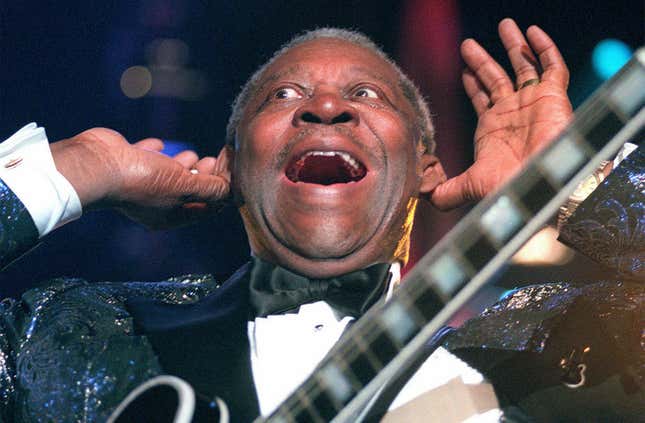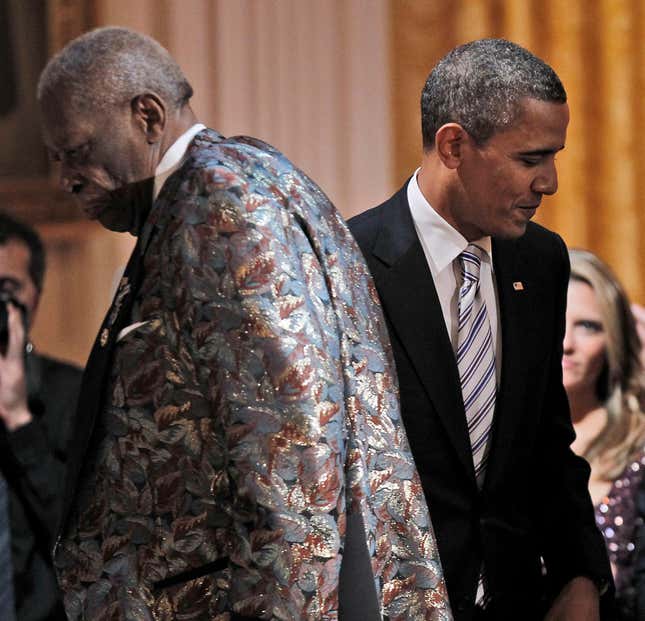Never ever forget the great ones who came before you.
We give props to the folks at Google for keeping some of our historical events and figures at the forefront through its remarkable Google Doodle initiative, which dates back to 1998 and aims to “enliven the Google homepage and bring smiles to the faces of Google users around the world.”
Monday’s illuminating, animated Google Doodle will celebrate the life and legacy of B.B. King—the iconic “King of the Blues”—commemorating what would’ve been his 94th birthday.
It will appear on the Google homepage and when users click on the image, they will be taken to a video.
Born Sept. 16, 1925, on a Mississippi Delta plantation near Berclair, Miss., Riley B. King was a sharecropper’s son whose soulful, piercing guitar solos became recognizable with a single note.
Often imitated but never duplicated, B.B. King’s sound became a blueprint for many of the world’s biggest rock stars who followed.
“I wish I could just do like B. B. King,” John Lennon once said. “If you would put me with B. B. King, I would feel real silly.”
Raised singing gospel music in church, King picked cotton and drove tractors before taking to playing guitar, after being taught by his preacher uncle. He performed on street corners before making his way to Memphis and landing a daily job on the air at radio station WDIA (regarded the first radio station in America entirely programmed by African Americans for African Americans) in 1948. There, station management re-christened him with the moniker “Beale Street Blues Boy,” which was later shortened to “Bee Bee” and finally “B.B.”
King began recording in 1949 and his cover of Lowell Fulson’s “Three O’Clock Blues” became one of the biggest selling songs of 1952.
Named one of the greatest guitarists of all time by Rolling Stone, King won 15 Grammys and sold more than 40 million records worldwide—considered a remarkable number for the blues.

Known for averaging more than 300 shows a year throughout various points in his career, King was revered by artists and dignitaries far and wide.
He collaborated with Queen of Soul Aretha Franklin, recorded with Eric Clapton, Elton John, U2 and shared the stage with Solange (for a great rendition of his most famous recording “The Thrill Is Gone” for a 2009 television special.)
Inducted into the Blues Foundation Hall of Fame and the Rock and Roll Hall of Fame, King’s opus “Live at the Regal” was declared a historic sound and permanently preserved in the Library of Congress’ National Recording Registry.
On 1990, King was awarded the National Medal of Arts, which is the highest honor given to an artist or arts patron by the United States government.
Illustrated by Little Rock-based guest artist Steve Spencer and animated by Brooklyn-based guest artist Nayeli Lavanderos, today’s Google Doodle depicts the Rock & Roll Hall of Famer, who died in 2015 at age 89, doing what he was known for; playing guitar—the famous instrument named Lucille.
Lucille is heard on his most popular recordings, including “The Thrill Is Gone” and “Sweet Little Angel.”
“When I sing, I play in my mind,” King once said. “The minute I stop singing orally, I start to sing by playing Lucille.”
According to Rolling Stone, the instrument’s name dates back to the winter of 1949 when King was in his early 20s and performing at a nightclub in Twist, Ark.
Two men—engaged in fisticuffs over a woman—knocked over a kerosene heater causing a fire. King, who said he escaped death, went back to the club to save the guitar. Later, he discovered the woman’s name was Lucille and the rest is history.
The guitar, a black Gibson ES-345 prototype guitar, is reportedly estimated to be worth $80,000 to $100,000 and will be auctioned at the Los Angeles-based Julien’s Auctions on Sept. 21 in Beverly Hills and online.
In the early 1980s, King donated about 8,000 recordings to the University of Mississippi and also supported the B.B. King Museum and Delta Interpretive Center in Indianola, Miss., a $10 million, 18,000-square-foot structure, built around the cotton gin where King once worked.
“I want to be able to share with the world the blues as I know it—that kind of music—and talk about the Delta and Mississippi as a whole,” he said at the center’s groundbreaking in 2005, reported the Associated Press.
“B.B. King…became the ambassador who brought his all-American music to his country and the world,” Barack Obama wrote on Facebook upon King’s passing. “No one worked harder than B.B. No one inspired more up-and-coming artists. No one did more to spread the gospel of the blues.”
Black America’s very first (sorry William Jefferson, but NO!) and forever president Barack Hussein Obama hosted King and other music luminaries during the White House Music Series saluting Blues Music in recognition of Black History Month on Feb. 21, 2012.
During the finale of the star-studded East Room event, the charismatic world leader hammed it up and even attempted to sing in a knockdown, dragged-out jam session rendition of “Sweet Home Chicago,” which also featured Koko Taylor, Mick Jagger, Buddy Guy, and Jeff Beck.


